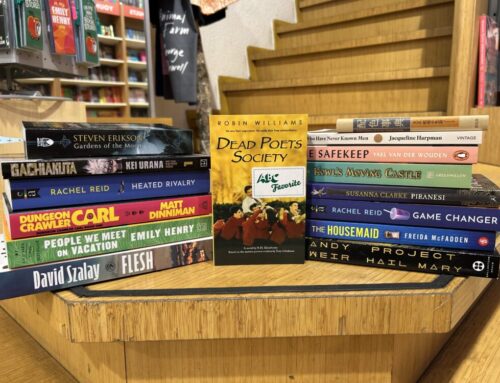If you’ve been to our Amsterdam store recently, you may have noticed our magazine section has been reduced by half. Things have been less dramatic in The Hague, but the number of magazines on offer there has also been steadily decreasing.
Many magazines still being printed are coming out less often or slimming down. This month marks the annual release of Vogue’s industry setting September issue, which has gone from a 2012 high of 916 pages (and almost five pounds!) to some 390 last year.
ABC’s Lauren asked Lília, our magazine buyer for the past nine years, for the inside scoop.
Why is the number of magazines on offer decreasing?
There are several reasons. Quite a lot of magazines are not being printed anymore. Or if they are, they are subscription-only, meaning there is a lot less to offer.
For example, we recently had a customer asking for National Geographic. I went looking for it and found that we actually haven’t received anything since last year. I talked to the supplier, and they said they’re not printing them anymore for distribution, only for subscription directly from the publishers.
And that’s because printing and distribution costs are so high nowadays, especially after COVID. It’s not that people don’t get magazines, but they don’t get physical copies, as lots of titles are becoming online only.

Good examples of online only magazines are Forks over Knives, a wonderful cooking magazine; Black Belt about the martial arts and Entertainment Weekly, which is available online only since 2022.
And Heavy Metal and Rodder’s Journal are good examples of magazines that have actually been completely cancelled. But sometimes they do a come-back: I’ve just read Heavy Metal is preparing to relaunch.

I think a bit, but it’s actually not that there is a decline in magazine reading, but a decline in readership concerning hard copies. As I’ve mentioned before a lot of people have migrated to online. The newspapers are a good example. Many people don’t buy the physical newspaper anymore, just the online version. We still sell quite a few magazines, but we’ve been selling less in the past few years.
Who still reads magazines?
I think mostly the older generation, people from 35-years-old and older. But you also have younger people who want to read, especially kid’s magazines.
The older generation loves magazines in general, but also puzzle books and such. The younger generation wants a magazine because there is somebody on the cover or an interview with a well-known person. So, if a magazine features, for example, Billie Eilish, Dua Lipa or Taylor Swift, it will sell. Also, children between the ages of six and 10 like magazines with princesses or characters like Spiderman. We carry a few of them, including Disney Princess and Hello Kitty.
What are some of ABC’s big sellers?
It depends on the store. But in The Hague, we have a reservation list for Warships magazine. I have six or seven reservations for that one, all older men. It’s for military and navy buffs, my husband being one of them!

What about entertainment and food magazines? Are they still popular with ABC customers?
We don’t carry Us anymore, but we do still carry People magazine, because I think you have to have at least one entertainment title, and it’s the least bad of the celebrity magazines. But it doesn’t sell that well anymore because if people really want to know something, they just go online and check.
Although in The Hague, we do sell some British weekly magazines – Women’s Weekly, Woman’s Own and Bella – for women 65+ – by reservation only. And at this moment, Doctor Who Magazine is also selling well!

Is it hard to be a magazine buyer given the changing landscape of the last few years?
It’s always a challenge because you must keep up with what’s going on, what’s coming out and what can be sold. There are quite a few interesting titles, but they don’t sell that well, or the distribution is just very small.
Foam Magazine [an international photography magazine published two times a year in Amsterdam] is an example. It’s a really nice magazine to have, but we have to order quite a lot to be able to return the ones we don’t sell, or we must pay upfront to have just a few. So there are certain limitations.
The good thing about magazine buying is that you can return them if they don’t sell. Of course, you always lose some money with that, but you have to weigh what’s interesting to have and how many copies you need. That’s one of the most challenging things: to know what kind of titles you should have.
Is declining magazine readership a recent trend?
No, it’s been a slow decline, which is different from books. Fifteen or 20 years ago, we kind of thought e-readers would take over. But they didn’t.
I think it’s unfortunate for a lot of parents nowadays. Sometimes we forget that children need physical touch for their development, which can come via a magazine. The tactile experience is very important.
From your perspective, what’s the future of magazines at ABC?
We will continue to carry magazines, just maybe not as many as we used to. They’re still here, but I wouldn’t say that they’re here to stay. The future is less magazines, and at a certain moment, it’s going to become obsolete, because it’s quite expensive to make good magazines (or even bad ones). And the distribution is getting a lot more complicated and more expensive.
Personally, I think there will come a point where it’s less interesting to sell them. A lot of paper is being thrown away, so environmentally speaking, magazines are not very sustainable.
But for now, they’re still here!
And if you want a title you don’t see at one of our stores, let us know and we will try and order it.





